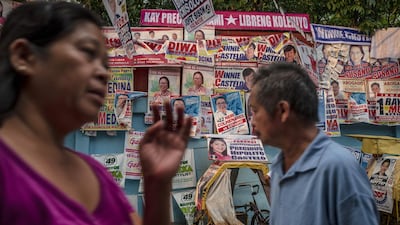Voters in the Philippines will head to the ballot boxes on Monday in a midterm election widely predicted to serve as a positive referendum for the reign of President Rodrigo Duterte.
Dissenting figures are not expected to make significant gains and analysts say they fear the democratic safeguard of the Senate will be further undermined, turned it into a rubber-stamp body.
At stake are congressional, provincial and local body elections, and 12 of 24 seats in the Senate.
Imprisoned chief opposition figure, former senator Leila De Lima, is set to cast her ballot under the "escorted detainee voting system".
But judges have ordered her to refrain from giving interviews before and after voting.
It will not be the first time De Lima's dissenting voice has been stifled during her two years in jail.
Human Rights Watch researcher Carlos Conde described at times bizarre tactics used to silence her.
While being taken to court appearances, police surrounding her have been known to cough in unison to drown out fleeting comments she tries to make.
As the head of the human rights commission, De Lima had investigated Mr Duterte when he was mayor of Davao City.
"He never forgave her for that and vowed repeatedly if he won as president that he'd destroy her," Mr Conde told The National.
“It’s not just political animus. She serves a larger purpose in this environment of fear here.
"She’s a politician who dared to go against Duterte and there’s only a handful of them. Even some of her partymates were timid in response to her persecution.”
In a statement to a civil society meeting on Friday, De Lima cautioned voters against further ingraining a culture of dynastic and venal politics.
"Let our vote be a protest vote against those who have looted their way to power," her statement said. "Also this May 13, let us cast our vote for the future of our children."
Chief among concerns from observers is a tightening grip on the Senate, which looks set to be stacked with Duterte allies and pliant figures. The president cannot make appointments directly but his endorsements matter.
In recent years, the Senate has blocked attempts to reinstate the death penalty.
Along with his largely unpopular bid for charter change towards a federal system, Mr Duterte has also pushed to lower the minimum age of criminal responsibility from 18 to 12.
“It's not an exaggeration to say that the Senate is the last credible government space for opposition in the first three years of the Duterte regime,” said Hansley Juliano, who is on the political science faculty at Ateneo de Manila University.
“Nearly every major anti-democratic and anti-rights policy of Duterte that went in smoothly in the lower House of Representatives – or at least was retroactively justified by Supreme Court opinions – were blocked in the Senate.
"Achieving supermajority in the senate virtually renders the Philippine state one with an uncontestably dominant president and a virtually subservient parliament."
While the opposition has always been a minority in the senate, Mr Conde said the independence of the body was now compromised.
“It would be simplistic to blame Duterte for all the damage,” he said. “All this dysfunction laid the groundwork for Duterte and he seized the opportunity, and it is now damaging institutions.”
A failure to maintain the integrity of such institutions had enabled the rise of a leader such as Mr Duterte, Mr Juliano said.
“Nearly all of the problems we experience follow the playbook of what liberal democracies throughout history have failed to do, which creates voids where anti-democratic and populist leaders can thrive and dismantle any semblance of respect for the rule of law,” he said.
Beyond the outcome of the midterms, observers say Mr Duterte’s reign has given voice to a bellicose brand of politics and normalised violence.
Election-related deaths climbed to 17 over the weekend, the Philippine National Police said.
Police also noted some 40 reported cases of election-related violence, ranging from threats and a slapping to stabbing and assaults that injured 22 people.
“Worst-case scenario, we will have local mayors, governors and senators who will have no qualms about using violence as a means of political control,” Mr Conde said. “That is, I think, at the core of this campaign.
"Duterte has managed to enable this violent environment and validate it. My fear for this election is that a lot of Duterte clones will emerge. They see that it worked for him and that can only mean more mayhem.”

